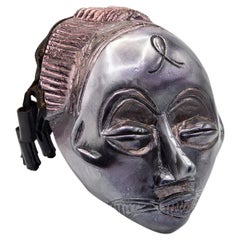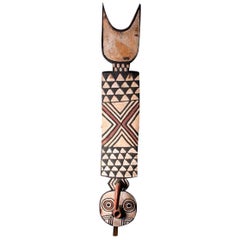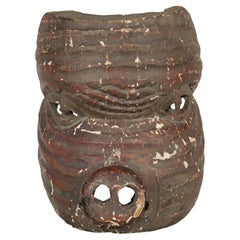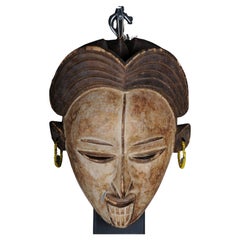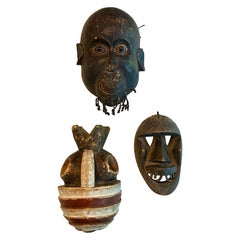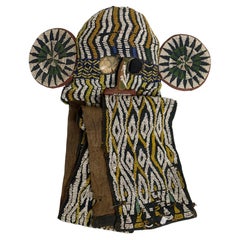Masks
Early 1900s Angolan Tribal Antique Masks
Wood
Early 20th Century Burkinabe Primitive Masks
Wood
19th Century Thai Tribal Antique Masks
Wood
20th Century African Masks
Wood
Mid-20th Century Congolese Folk Art Masks
Wood
Early 20th Century Cameroonian Masks
Cotton, Beads
Early 20th Century Indonesian Other Masks
Wood
20th Century Congolese Masks
Wood
Mid-20th Century Mexican Folk Art Masks
Paint, Wood
Early 18th Century Japanese Edo Antique Masks
Wood
20th Century Cameroonian Masks
Wood
Mid-20th Century Papua New Guinean Tribal Masks
Organic Material
Early 20th Century Indonesian Other Masks
Wood
19th Century Indonesian Other Antique Masks
Wood
1940s French Vintage Masks
Composition
1980s Mexican Post-Modern Vintage Masks
Aluminum
20th Century Cameroonian Masks
Organic Material
20th Century Swiss Tribal Masks
Bone, Wood
Mid-20th Century Ivorian Tribal Masks
Wood
1970s Malian Vintage Masks
Wood
Early 20th Century Guinea-Bissauan Tribal Masks
Hide, Wood
20th Century Congolese Masks
Wood
Late 19th Century European Antique Masks
Pine
Mid-20th Century Papua New Guinean Tribal Masks
Organic Material
20th Century Congolese Tribal Masks
Wood
1960s Congolese Vintage Masks
Wood
Mid-20th Century Japanese Meiji Masks
Wood
Early 1900s Congolese Tribal Antique Masks
Wood
Mid-20th Century Nigerian Tribal Masks
Wood
Late 19th Century Japanese Meiji Antique Masks
Wood
1950s Ivorian Folk Art Vintage Masks
Wood
1970s Indonesian Tribal Vintage Masks
Teak
21st Century and Contemporary Italian Folk Art Masks
Metal, Metallic Thread
1970s Vintage Masks
Wood
1960s American Vintage Masks
Paper
20th Century Japanese Showa Masks
Wood
19th Century Indonesian Other Antique Masks
Wood
1930s Malian Folk Art Vintage Masks
Shell, Wood
Early 20th Century Indonesian Other Masks
Wood
1940s Papua New Guinean Tribal Vintage Masks
Cane, Rattan, Wood
Early 20th Century Japanese Masks
Lacquer
2010s Italian Futurist Masks
Wood
Mid-20th Century Papua New Guinean Tribal Masks
Natural Fiber, Acrylic
Mid-20th Century Italian Baroque Masks
Ceramic
1970s Indonesian Tribal Vintage Masks
Teak
1950s Ivorian Tribal Vintage Masks
Wood
Early 20th Century Indonesian Other Masks
Wood
1970s Indonesian Other Vintage Masks
Teak
1950s African Vintage Masks
Wood
Early 1900s Ivorian Tribal Antique Masks
Wood
20th Century Ivorian Masks
Fur, Wood
19th Century Antique Masks
Wood
Early 20th Century Nigerian Tribal Masks
Wood
Mid-20th Century Congolese Tribal Masks
Wood
Early 20th Century Ivorian Masks
Wood
20th Century Malian Masks
Wood
20th Century African Masks
Wood
Mid-20th Century Congolese Masks
Copper
Mid-20th Century Ivorian Tribal Masks
Wood
20th Century African Masks
Wood
Antique and Vintage Masks
Today, art enthusiasts and venturesome interior designers find a lot to love and appreciate about antique and vintage masks, particularly as they have earned a distinct place amid a collection of folk art and other collectibles and curiosities in contemporary homes.
Folk art refers to art that people, not classically trained, created for either utilitarian or decorative purposes. With respect to visual art in folk art, it is typically reflective of a community’s culture and usually handmade by craftspeople working within a popular tradition. Masks, as part of this history, have been used in carnivals, theater, medicine, therapy, religion and more. The use of masks in rituals and sacred ceremonies goes back thousands of years, and masks in general are believed to be much older. And all kinds of other uses have been found for masks and face coverings over time. We have enlisted these accessories for protection, to signal modesty, facilitate flirtation, enable licentiousness or simply to look cool.
Archaeologists found a mask in Palestine that is believed to be 9,000 years old, a Neolithic-era stone mask that may have been part of rituals associated with the worship of ancestors. Some tribal masks are worn as an offering to the gods. Masks are among the most important African art forms, for example, and traditional African masks can be used to lend a concrete form to an invisible spirit. Dancers donning wooden tribal masks celebrate important events to honor their deceased ancestors. These masks are also very important devices for storytelling and sharing the oral history of a community.
For Asian artists, specific colors are used in masks to convey different values and ideas. In Japan, a red Oni mask worn by performers during a festival might signify anger, while in China’s Peking Opera, a mask that has been hand-painted gold would be worn by an immortal.
Mexican craftspeople make masks for traditional celebrations and ceremonial dances. Mexican masks are part of the country’s folk-art traditions that go back thousands of years and play a role in festivals and theater. A common symbol of the Mexican holiday Day of the Dead is a skull, which is widely represented in masks (although the innumerable activities associated with the holiday are by no means universal).
We’re inviting you to explore and pay respect to the long folk-art traditions that underpin mask-making by introducing antique and vintage masks to your space. Find an exciting collection on 1stDibs today.
